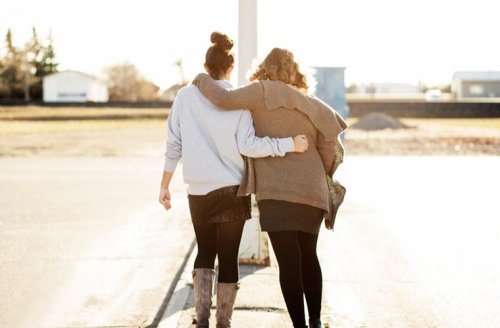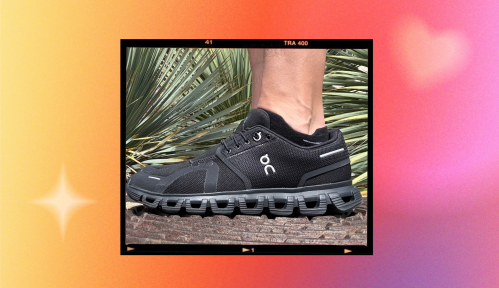Our editors independently select these products. Making a purchase through our links may earn Well+Good a commission
When I found out that one of my closest friends had shared very personal things I told her in confidence, I was shocked. How dare she make my private life so public? But maybe, in retrospect, I shouldn’t have been. After all, I had heard her share personal stories about other people. Why would I be any different?
We never had a blowout fight—the kind that ends in tears and slammed doors and imperative sentences like “Never contact me again!” But my moment of enlightenment marked the end of our tight bond just the same.
I didn’t think I could confide in her without wondering who else would hear all the gory details of my life, so I stopped sharing any of the vulnerable, real, and messy moments that exist behind the facade of a carefully curated “highlight reel.” Without trust, a strong friendship’s foundation erodes and an emotional wall is built. Our friendship became surface-level, then slowly started to fade until it consisted of little more than Happy Birthday texts and the hollow promise to “catch up soon!”
The phrase is Best Friends Forever, not Best Friends Forever-ish.
In a way, friendship breakups are worse than romantic breakups because you don’t really expect they’ll happen. When a romantic relationship starts, I know there’s a possibility it could end—there’s a reason you say you’re looking for “the one.” But with friendships, there’s an expected level of permanence: The phrase is Best Friends Forever, not Best Friends Forever-ish.
There are lots of reasons why trust can decay in a friendship. Your friend may gossip (like mine did) or say pointedly hurtful things because they know exactly what will pain you the most. They may break down your successes and accomplishments in order to build up their own sense of worth. The bottom line: If your friend makes you feel small or worthless, they’re probably not much of a friend at all. “Healthy friendships feel safe, secure, empowering, and uplifting,” says New York City-based licensed psychologist Lauren Hazzouri, PhD. “A friend is a true friend when her presence reminds you of all that you are, not all that you’re not.”
So what should you do if a friendship takes a turn? Do you talk it out? Send an email? Just…ghost? It depends on the severity of toxicity and how much you want to save the relationship. “If it feels safe enough to engage in [honest conversation], I encourage bringing up your feelings with your friend,” says Elizabeth Cohen, PhD, a New York City-based clinical psychologist. She adds that it’s helpful to use “I” statements, like “I feel sad when you criticize my dating choices,” so that the conversation doesn’t seem accusatory or put your friend immediately on the defensive.
“If the relationship feels too unsafe to bring something up, I would take that as a sign that the friendship is toxic,” says Dr. Cohen. “You need to take care of yourself and let go of the negative energy in your life. Friendships are a choice, not a chore.”
“Friendships are a choice, not a chore.”
It’s inevitable that you’ll miss the person and think about them often, especially at first. I thought of my friend when I passed the restaurant downtown we always used to go to, saw something that reminded me of a shared memory, or wondered what her advice would be when I decided to switch jobs or had a terrible first date. She was the person I’d turn to.
It’s incredibly difficult when a friendship ends or evolves—even if you know it’s for the best. “Give yourself the freedom to process, grieve, and heal just as you would when a romantic relationship ends. Remind yourself why things ended,” advises Melanie Ross Mills, PhD, a Texas-based therapist and author of The Friendship Bond. She recommends focusing on strengthening other relationships and being a thoughtful and supportive friend in turn.
When you break up with a significant other, you open yourself up to finding a relationship that’s better for you. Friendship is really no different. “[You’ll] see what friends are brought into your life because you have not only opened up your heart space for the next friendship, but you’ve also recognized that there’s a big difference between the fun, ‘good time’ friend and the purposeful, trustworthy friend,” says Dr. Ross Mills.
And in those moments of sadness, think about the things you gained from the friendship. (“Remembering the good times” is a cliché for a reason.) I couldn’t bring myself to delete her from my contacts list, and our breakup wouldn’t erase the memory of that epic Galentine’s Day celebration we had. If we ever do set a date for that catch-up coffee, I’m sure we’ll share another happy memory to add to our collection—even if I won’t be sharing my secrets.
Even if you and your childhood BFF grow apart, you still have a lot to thank them for. And making new friends as an adult is possible—promise! Here’s how to do it.
Sign Up for Our Daily Newsletter
Get all the latest in wellness, trends, food, fitness, beauty, and more delivered right to your inbox.
Got it, you've been added to our email list.











